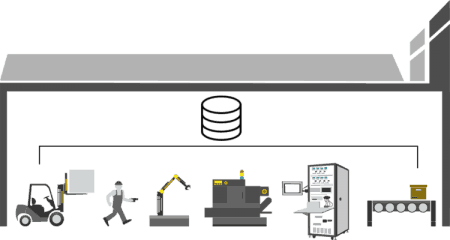It has also identified that manufacturers are currently connecting operations to gain greater visibility and improve quality assurance. They are expecting up to 5% growth in revenue year after year and cite the flexibility to adjust to fluctuating market demand, as being a top business strategy.
The Rising Importance of Connected Factories
One of the reasons manufacturers are implementing Connected Manufacturing in their factories, is to keep up with increasingly complex Bills of Materials (BoM). These are driven by customer demand for customised products.
For example, we helped our client Mettler Toledo Safeline implement a factory control system. It adjusts the manufacturing process in real-time, based on the BoM retrieved from their MRP system. Our solution allows for last-minute order changes when products are in manufacture, because the software is constantly checking for changes in the product BoM. As a result, we are helping our client to deliver highly customised products at competitive prices.
Making Better Business Decisions
Business managers need accurate data to make well-informed business decisions. One of the main impacts of connected factories is that the amount of data collected, stored and analysed will rapidly increase. Clients who are currently implementing connected manufacturing, are able to gain insights into their processes that were previously hidden.
Our client ESR Technology, have experienced the benefits of this by using our automated test software Metest. They use Metest in the R&D cycle of their product development and also to run automated design validation tests. They include data analysis in their test sequences. This performs real-time analysis and decision making, that previously took engineers weeks to complete. This has the effect of cutting the design cycle time. As a result, they can get products to market much more quickly than was previously possible.
Saving Money Through Quality Management
Manufacturers are beginning to realise that higher profit margins and growth, can be achieved through better quality management. By catching manufacturing errors earlier in the manufacturing process and rectifying mistakes immediately, costly rework can be reduced and eliminated at the end of the production line.
Our client Husco International uses our Manufacturing Execution System (MES) Tascus, in their strive for a zero defects manufacturing process. They are using this philosophy to win new business with highly complex, highly customised products to high-end automotive companies. Husco uses Tascus to implement approximately 10 – 15 quality checking gates in their manufacturing process.
Tascus has a minimal time impact on the manufacturing process. It extracts data automatically from existing production equipment and has a dramatic impact on product quality and a reduction in reworks. This is due to the rule checking logic that as a result, ensures each product conforms to the customer specifications.
Using Connected Manufacturing to Stay Competitive
Connected Manufacturing is currently transforming the way manufacturers create their products and deliver them to customers. It is the manufacturers who are identifying opportunities to improve their product quality and services, who will maintain their competitive advantage.




